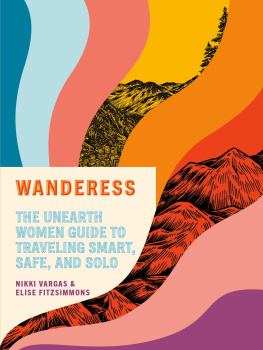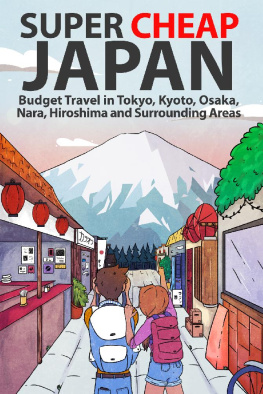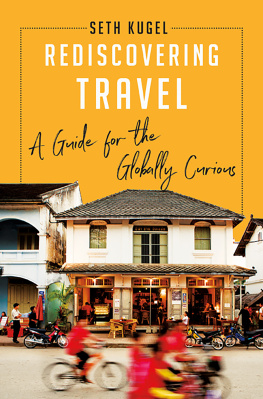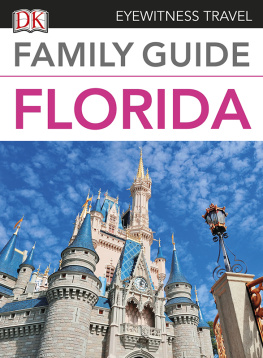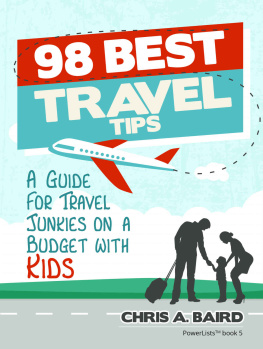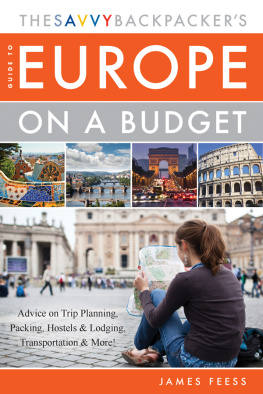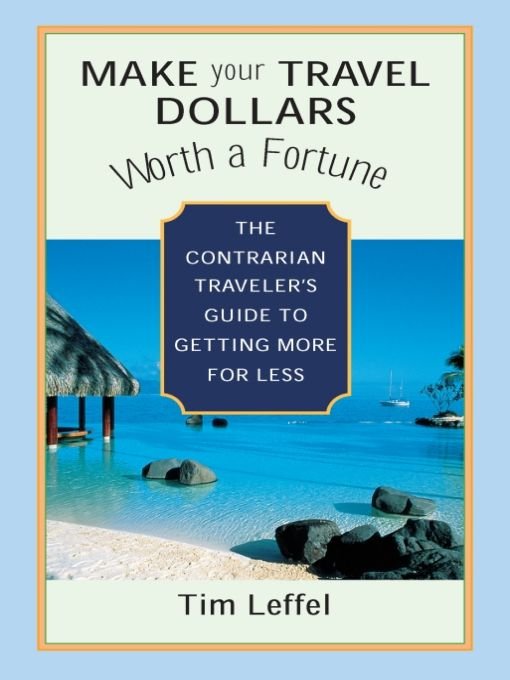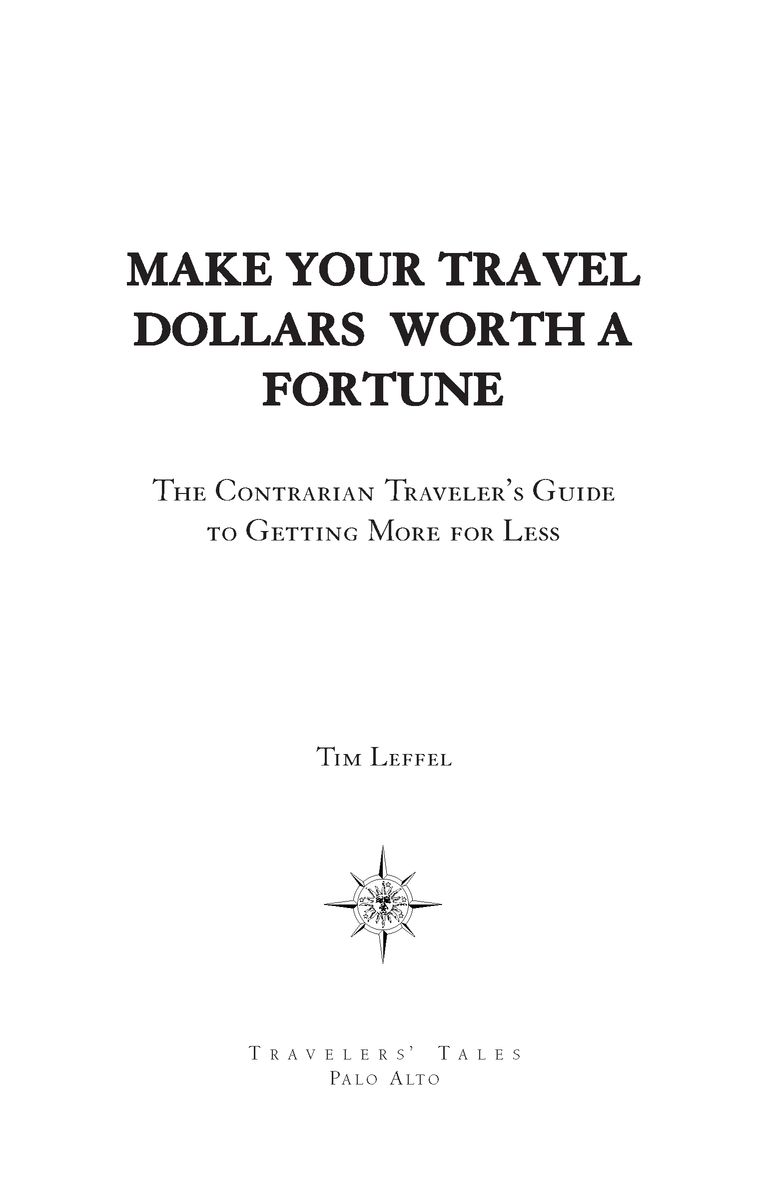Table of Contents
TIM LEFFELS MAKE YOUR TRAVEL DOLLARS
WORTH A FORTUNE IS FULL OF SOLID ADVICE AND
UNDENIABLE PRINCIPLES OF SMART TRAVEL.
ARTHUR FROMMER
To Donna
For dragging me off the work
treadmill and then being by my
side on five continents.
INTRODUCTION
How Do You Make Your Travel Dollars Worth a Fortune?
I will go to my grave claiming that the less you spend, the more you enjoy, the more authentic the experience it is, the more profound, the more exciting, the more unexpected.
Arthur Frommer, interviewed in A Sense of Place
A cartoon shows a couple exiting the airplane, suitcases in hand. The woman says, That was the trip of a lifetime! The man says, Good thing, because thats how long well be paying for it.
For far too many travelers, this isnt a joke.
This book is a tale about two kinds of travelers: those who pay more than they need to by doing it the standard way, and those who make their travel dollars worth a fortune by choosing a different path. Those who travel like sheep and those who dont.
Living somewhere in Anytown, USA is a v ery average American couple named Mr. and Mrs. Smith. Last year they took a very typical vacation. They talked about where they wanted to go and decided that London would be nice. They couldnt put their finger on why, but they agreed that they had always wanted to go there. Summer seems to be the time to go, they agreed, probably because the weather is nice then.
They checked into vacation packages soon after. I didnt realize it was so expensive to go to London, said Mr. Smith. Neither had been reading the financial news and had no idea the dollar had declined 25% against the pound. They did not do any research about seasons, so they had no idea that summer is the most expensive time to fly.
After some cursory checking around, the Smiths booked a package containing a flight, six nights in a chain hotel whose name they recognized, and a rental car for three days. They were flying that airline for the first time and it wasnt connected to any of their frequent-flyer plans. They werent quite sure where the hotel was, but the description said central London. Since they had a rental car for three days, they immediately set about making plans for day trips to Bath, Cambridge, and Brighton. Might as well get our moneys worth, said Mrs. Smith. Online they bought theater tickets for two nights and they made a detailed list of every museum and site they wanted to see.
The flight didnt earn the Smiths any useful mileage and since it wasnt connected to any program where they did have a lot of mileage, they could not upgrade their ticket. They sat in a cramped coach cabin for seven hours. The hotel room was tiny, routine, and far from any subway station. They spent hundreds of dollars on taxis and could not walk to anywhere for dinner in the evenings. The restaurants they did go to, mostly ones featured in their guidebook or the magazine in their hotel room, were forgettable. They found out they could have bought theater tickets to the shows they attended for half-price if they had waited until the day of the show. They were exhausted from their long day trips out of town and ended up scratching the car twice because they werent used to driving on the left side of the road. They ended up missing some of the London attractions on their list for lack of time, despite spending six or eight hours a day sightseeing. Who knew the British Museum was so big? Mrs. Smith asked.
The flight home was grueling and all the expensive souvenirs they bought made the trek through airports and customs even more difficult than it had been on the first leg. In the end, the Smiths spent a fortune on their vacation, but didnt really enjoy it that much. Both badly needed to get some extra sleep for the following week and were dragging at work. They winced when they opened their hefty credit card bill.
Does any of this story sound familiar? Not to the Johnsons. They spend half as much and enjoy their trips twice as much. Come along and see how they do it.
GETTING AWAY FROM THE HERDS
This book is subtitled The Contrarian Travelers Guide to Getting More for Less, because it takes some alternative action to really make your travel dollars worth more. You could describe the contrarian traveler with many words: uncommon, adaptive, astute, resourceful, or savvy. The idea is that by taking the left fork in the road, while everyone else is taking the right fork, these people are able to save a bundle, and get a better experience for their money, every time they travel. If you yin while everyone else yangs, youre almost guaranteed to get a better deal.
A study by the National Academy of Sciences found that mice and humans react the same way when trying to escape a crowded room. The scientists set up a model based on where the exits were and it worked every timemice and men both defy logic and rush together with a like mind. Another study conducted at Emory University found that chimps are conformists. When one chimp was taught how to retrieve food, he or she would teach that method to the group. Even if other chimps were trained individually on different methods later, they soon abandoned them for the more popular group technique.
Fortunately, when we take time to think, we can do better than mice or monkeys. A report on the September 11 terrorist attacks, written by the National Institute on Standards and Technology, found that at least 2,500 World Trade Center lives were saved because people ignored what authorities told them to do. They heard the official advice to stay put, decided it was stupid, and got the hell out of there.
Going against the tide does require a bit of sense and a willingness to think independently. Being contrarian is a common theme in the financial world when it comes to investment decisions. The typical individual investor sells low and buys high, time and time again. An academic study that looked at the actions of U.S. mutual fund investors over time classified them as short-term-return chasers who move as lemminglike masses. To get rich, the authors surmised, all you have to do is watch what the masses are doing and take a different path. Buy when theres a panic, sell when theres euphoria. The contrarian investor wins. Sounds easy, but most people cant stick with it.
There is a similar lemminglike movement in travel. Nearly everything you read touts the same predictable, expensive path. There are good reasons for this, which Ill go over in the first chapter, but the bottom line is that you are not likely to read a lot of advice about getting a truly good, against the grain travel deal in your local newspaper or glossy travel magazine. (There are exceptions, which Ill point you to later.) What I will provide in this book is a base of solid principles you can use to get better values each and every time you travel.
This is a guide to saving money on travel by avoiding the peaks: peak crowds, peak seasons, peak destinations, and peak hotels, to name a few. This book will show you how to get the best deals every time by looking at each angle, not just at the most obvious costs, such as airfare. By following the easy-to-remember strategies outlined here, you will find ways not only to save money this year, but to save money each vacation for the rest of your life.


